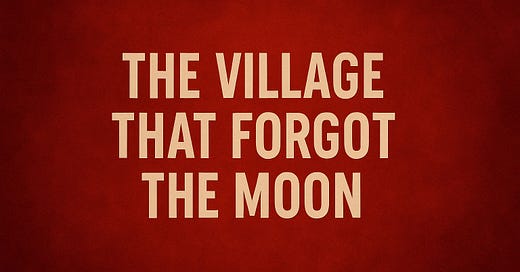This story lives on the shadow-side of my upcoming novel, The Light Beneath — in the forgotten corners where myths breathe and memories sleep too long.
It was written in homage to Ray Bradbury — a master of quiet wonder, impossible longing, and the fire that lives inside forgotten things.
To remember the moon is not just to reclaim the sky.
It is to reclaim ourselves.
“We are an impossibility in an impossible universe.”
— Ray Bradbury
The Lyre and the Silence
They had no name for it anymore.
Not the curve of it.
Not the light it cast.
Not the silver hush it used to spill across the fields when the world slept without fear.
In the village of Emberreach, they had burned all the old sky-books during the second forgetting. Children were taught to draw their eyes downward, toward the work, the soil, the sanctioned glow of the Crown’s beacon-orbs.
To look up was to invite the Hunger.
To ask questions was to breathe dust.
So when the acolyte came — cloak torn, eyes bright, bearing a lyre carved from forgotten bone and wired with memory-hair — the elders met him at the edge of the ash-ring and told him to walk on.
“We are clean here,” they said.
He smiled, but it wasn’t a smile the elders liked. It wasn’t afraid.
“No place is clean,” he replied. “Only quiet.”
He took no shelter. Made no demands. Just sat on the lip of the well and tuned the lyre at dusk, fingers plucking no melodies anyone recognized.
The children were the first to notice.
They crept close while their parents slept — not too close, just far enough to hear. Far enough to feel. And the feeling was strange. Like the taste of a fruit that had never grown in the ash. Like a word you almost remembered.
One girl whispered, “It sounds like something missing.”
The others nodded.
The wind didn’t.
The wind curled around the stranger but didn’t scatter his notes. It listened. And that was worse.
The village sky, long a flat curtain of soot and static, stirred.
Only slightly.
But it stirred.
On the second evening, the acolyte began to hum.
No words. Just tone — slow, hollow, circular. Like the sound of a bell rung too deep to echo.
The children gathered again, closer now. One boy — Garran, the baker’s son — reached out and touched the edge of the lyre. He yanked his hand back with a hiss.
“It bit me,” he whispered.
A single drop of blood welled from his fingertip.
The acolyte looked up.
“It remembers,” he said softly.
The boy didn’t understand, but neither did he run.
Behind them, shutters clicked open in the dark. Faces stared through the gaps, pale and hard. The elders were watching.
And disapproving.
In the central hall, High Warden Merel pounded her staff once against the stone and said, “He’s a Spiral remnant. Send him to the Wastes.”
But the vote fractured.
Some among the council had felt something too. A pull in their chests. A tension in the ash. Like the shape of something long buried shifting beneath them.
That night, no one slept well.
Some dreamed of water. Some dreamed of the sky breaking open.
And one old man — Jalen, whose wife had died remembering — woke with a single word on his lips.
“Luna.”
He said it again before dawn, like prayer or curse.
The word tasted forbidden. It tasted sweet.
And outside, by the well, the acolyte plucked a string that made the ground itself shiver.
That’s the opening movement.
The Village That Forgot the Moon continues next Thursday — in ash, in silence, in memory.
Until then, listen for the hum beneath the noise.
And if you remember the moon, you’re not alone.





